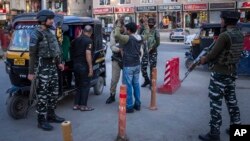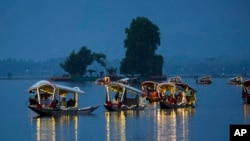Some 60 delegates representing most G-20 nations arrived in Indian-administered Kashmir on Monday for a tourism meeting that drew criticism from China and Pakistan before it began.
India has deployed high security for the meeting, with National Security Guards, marine commandos and Border Security Force personnel joining dedicated police units to provide security for the third G-20 Tourism Working Group Meeting in the scenic landscapes of Srinagar, Kashmir.
Delegates are expected to discuss ecotourism, destination management and tourism promotion strategies. The gathering is the first international event held in Kashmir since India ended the region’s semi-autonomy in 2019.
Neighboring Pakistan and China, which each have border disputes with India, both objected to the meeting last week, saying such meetings cannot be held in disputed areas.
The United Nations Special Rapporteur on Minority Issues, Fernand de Varennes, last week also criticized the meeting, saying that by hosting the session in Kashmir, “India is seeking to normalize what some have described as a military occupation.”
In India, even commentators who are sympathetic to the government’s campaign to hold the meeting in Kashmir say the security situation in the region undercuts the government’s message of stability.
Pravin Sawhney, a former Indian army officer and widely published defense analyst, asserts the G-20 meeting is the government’s way of conveying to the world that Kashmir is part of India and that the situation there is normal.
“The message to the domestic audience is that the government has the will and ability to meet the twin challenges of Pakistan and China,” Sawhney said. “However, the ground reality is not what the government says.
“The amount of security deployed in the Kashmir valley conveys that [the] government is nervous about the security situation,” said Sawhney.
Sheikh Showkat Hussain, a Kashmiri political analyst, said the importance of the meeting in Kashmir is being exaggerated by the government of Indian Prime Minister Narendra Modi. Hussain said that while the government is presenting the conference as an achievement to the Indian masses, such events have taken place in the region before and are not as significant as is being claimed.
Hussain said the presence of foreign tourists in Kashmir does not depend on such conferences but rather on the peace and security of the region. He expressed skepticism about the notion that tourism will receive a boost solely from this event and instead argued that tourism will flourish when people perceive Kashmir as a secure destination.
People in Kashmir will ‘see benefits’
While welcoming the G-20 group, Ahsan Pardesi, National Conference provincial vice president, Kashmir, told VOA that he hopes the people of Jammu and Kashmir will get to see benefits from the event.
“As far as showcasing Kashmir on an international level is considered, it’s been done in the past as well when the Zubin Mehta concert was done. Definitely, G-20 is a much bigger and more significant event, but what we see beyond the tourism summit is a diplomatic victory the current dispensation is trying to convey,” he said.
Others in Kashmir say they hope the meeting signals a resumption of more tourism to the region after some European countries gave it a “negative travel advisory” in recent decades.
“For the last many years, Kashmir has witnessed several tourists and travelers, mostly from the countries which have issued ‘negative travel advisory’ like Spain, Germany, Austria, etc. It is the right time to let people legally and freely walk in Kashmir,” Mohsin Dar, in-charge Bar and Bench in Jammu and Kashmir, told VOA.
India assumed the year-long presidency of the G-20 on December 1, 2022, and is hosting the G-20 summit for the first time.






